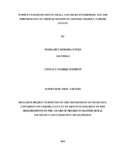| dc.description.abstract | In the developing countries, Small Micro Enterprises (SME) comprises 95% of all businesses
and 60-70% of employment. Although the majority of entrepreneurs are male, nowadays
female entrepreneurs comprise a quarter to a third of the total entrepreneurial population in
these countries. The contribution of the businesses owned by women to their economic
prosperity and social well-being has been increasingly recognized by governments of
developing countries because there is unequivocal evidence of its existence. Few studies have
been done on the female entrepreneurial population. In Kenya, there is a general lack of an
entrepreneurial culture and more particularly, for potential and operating women
owner/managers of SMEs. Informed by this knowledge gap, the present study therefore sought
to establish women‟s participation in small and micro enterprises and the performance of their
business in Gikomba market, Kenya. The specific objectives of the study were to examine the
characteristics of women entrepreneurs, to find out the types of businesses owned and managed
by women entrepreneurs, to examine the factors that influences performance of women owned
businesses and,
The study employed descriptive survey research design. The study population was women
entrepreneurs in Gikomba market, Kenya. The study used purposive sampling technique in
identifying a sample of 120 respondents from groceries, clothes, shoes, Jua Kali, Hardware,
and carpentry businesses. Data collection was done using questionnaire. The quantitative data
was analyzed using descriptive statistics with the aid of Statistical Package for Social Sciences
(SPSS version 20).
The study established that the majority of women entrepreneurs were young and energetic,
were breadwinners, lacked sound academic background, run small businesses, lacked access to
credit, lacked training on entrepreneurship and were members of social groups. The study
concludes that lack of a sound academic background, lack of training on entrepreneurship, lack
of access to credit; family obligations and lack of strong social networks negatively affected
the performance of women owned enterprises. The study recommends that women
entrepreneurs upgrade their academic skills, participate in training on entrepreneurship, expand
their businesses, form strong social networks, and seek alternative sources of funds in order for
their businesses to grow | en_US |

